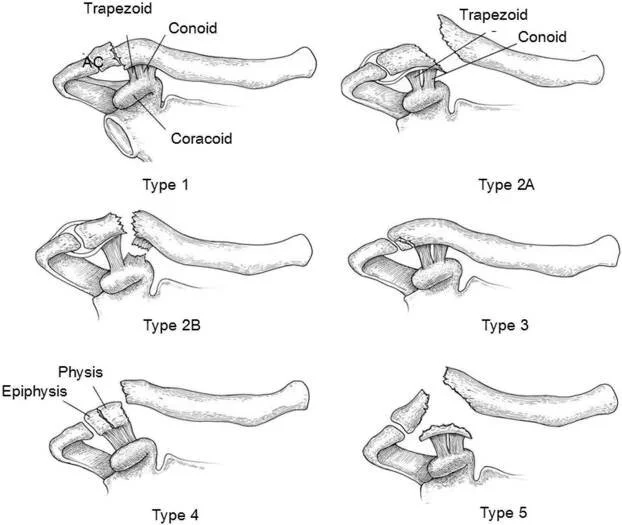
Clavicle Fractures
Authors
Dr Keran Sundaraj MBBS, MSc (Trauma), FRACS, FAOA
A clavicle fracture refers to a break in the collarbone. Accounting for 5 per cent of all adult fractures, this commonly occurs during a fall onto the shoulder or an outstretched arm.
Anatomy
The clavicle joins the sternum (ribcage) to the scapula (shoulder blade), thus connecting the arm to the body.
Important blood vessels and nerves run underneath the clavicle. These are rarely injured except in high-energy injuries such as motor vehicle accidents. However, they are important to consider if surgery is undertaken.
Types
Several types of clavicle fractures exist. Classifying them, along with assessing the fracture pattern, helps determine management.
Midshaft fractures
Occur in the middle third segment.
Account for 75-80% of all clavicle fractures.
Medina Perez G, Tran MM, McDonald C, O'Donnell R, Cruz AI Jr. Factors Affecting Patient Decision-Making Regarding Midshaft Clavicle Fracture Treatment. Cureus. 2020;12(9):e10505. Published 2020 Sep 17. doi:10.7759/cureus.10505
Lateral (distal) clavicle fractures
Occur in the outer third segment.
Account for 10-25% of all clavicle fractures.
Treatment is based on "stability" coracoclavicular ligaments (strong fibrous tissue running between the scapula and the clavicle).
Blaas LS, van Sterkenburg MN, de Planque AM, Derksen RJ. New possibilities: the LockDown device for distal clavicle fractures. JSES Int. 2020 Oct 15;4(4):713-718. doi: 10.1016/j.jseint.2020.08.021. PMID: 33345204; PMCID: PMC7738585.
Treatment
Midshaft clavicle fractures. Controversy exists over what is the 'ideal' treatment. Several factors are considered, including;
Fracture pattern (displacement, shortening, number of pieces)
Age
Hand dominance
Occupation
Medical comorbidities
Smoking status
Lateral clavicle fractures. Treatment is based on the 'stability of the coracoclavicular ligaments. If these are ruptured, the healing of the bone is less likely, and surgery is preferred. This may involve stabilisation of the bone with a plate, along with reconstructing the disrupted ligaments.
The goal is to optimise a patients function whilst minimising the risk of any treatment. Options include conservative measures (sling, rest, and physiotherapy) or surgical fixation with plate and screws. Complications of surgical treatment include;
Non-union (bones not healing).
Nerve injury, including a numb patch below the scar.
Blood vessel injury, as there is a major blood vessel that runs beneath the clavicle.
Wound problems or infection.
Hardware irritation (as the bone is relatively close to the skin with little soft tissue covering it).
Surgery may also be indicated when there;
Are multiple bones fractured, to make rehabilitation easier
Is a 'floating' shoulder (clavicle and scapula fracture)
Is a nerve or vessel injury
Is an open fracture (skin opening)
What to Discuss with Dr Sundaraj
What type of clavicle fracture do I have, and what is the best treatment?
How long can I expect off work?
When can I start driving?
How long will I be in a sling?
Can I remove the sling for sleeping and showering?
Do I need to be screened for osteoporosis (weak bones)?
When can I start physiotherapy?
What is the likely outcome from this treatment?
When do I need to come back?
Get in touch.
Fill out the form and one of the team will be back in touch within 24 hours.
Alternatively, give us a call on
(02) 9437 5999


